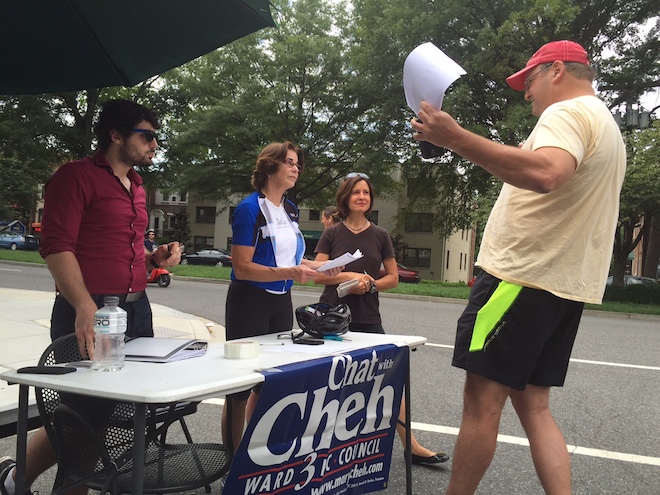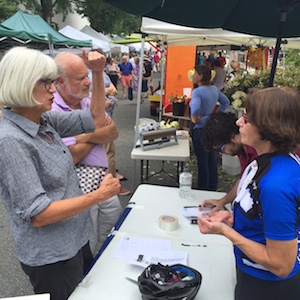From Ward 3 to the World, Cheh Chats, Charms

A tower of a man is frustrated and gesticulating. If he were a tree in a thunderstorm, you would run.
But standing all of five feet or so, squinting up at the smoking peak of this volcano, D.C. Councilmember Mary Cheh (Ward 3) doesn’t cower, judge or back away. She even leans in, listening calmly like a woodland pond.
The man’s property tax assessment is way too high, even for affluent Northwest Washington. Highway-robbery high, the man says. But calls and protest letters to the government have led only to defeat. Then, frustration. Finally, indignation.
“On top of everything, he was rude to me!” the constituent says, pointing in the direction of the faceless bureaucrat behind an imaginary green curtain, Wizard of Oz-like, who is the front man for this sanctioned stickup.
Cheh listens.
“The timing of the light at W and Foxhall is too short green, and too long red,” says Foxhall resident Jamie Tucker, while Cheh scribbles notes. “And while you’re at it, the stop sign down the block is blocked by vegetation -- 36th and W.”
With an ironic look, Cheh says, “Gee, how about we CUT that vegetation?!”
Taxes, tree limbs, teacher shortages, truancy. Mary Cheh is her constituents’ first and sometimes only line of defense, offense and everything in between when it comes to navigating life in the nation’s capital. She represents 80,000 voters from upper Georgetown to the Bethesda line.
So here she is, on a summer Sunday, when others are having brunch or sitting at the pool, standing for two hours at a booth at the Palisades Farmers Market under a hot sun as the temperature steams past 90. It’s one of her regular “Chats with Cheh” to hear from constituents. Oh, and she already biked 35 miles this morning to train for a 150-mile ride to support cancer research.
Whatever the problem, Tucker says, “Her office is on it. She is very accessible, very responsive.”
He likes her, but admits that “we don’t share the same political views.” Tucker doesn’t want to talk about the Republican primary, though. (What sane Republican would?) “I’m going to stay out of trouble and keep it to the traffic issues,” he says, bee-lining toward the organic flower stand.
Kate Berenson, an elegant former TV reporter in Tenleytown, is upset about a planned retail/residential development associated with Georgetown Day School that will add 1000 cars to already clogged Wisconsin Ave. near the Tenleytown Metro.
Berenson, representing the Wisconsin Avenue Gateway Group, says the developers are stonewalling on details. “I’ve read all the ANC minutes. I want to see a written description from GDS. The ANC actually sent GDS a letter, but there was really no response,” Berenson says.

Cheh leans forward again. “Can I make a suggestion? Resend your list of questions, and ask that the answers be published on the GDS website. Copy me on your letter. And I’ll do the same thing.”
“There were two letters from the ANC and a petition from us with 50 signatures!” Berenson says.
Some say, the developer is using the school as a cover to sneak through an outsized, neighborhood-unfriendly behemoth that will trample the rights of residents nearby.
Cheh, a constitutional law professor at George Washington University, counsels persistence.
“People have trouble with bureaucracies,” she says. “I listen to the problem, and try to understand whether I can solve it. Then I get more information.”
“We’re a service industry,” she continues, as aide Anthony Cassillo looks on and takes detailed notes. “On Monday we’ll have our list, and we’ll address these issues.” She’ll also be dropping in on the public schools in Ward 3 that week, flushing all the toilets, making sure everything is ready for the first day of school.
“I find out if they’re not ready for prime time,” she says.
After nine years on the D.C. Council, Cheh has the air of a happy warrior who takes pleasure in service, and pride in the landmark progressive measures she has led to enactment.
“That I was elected is preposterous. I didn’t have any money, I didn’t have any organization, and I still don’t. I’m not a politician,” she says. But she is a tireless advocate for those, she perceives, who don't have a voice.
Inspired by a D.C. Council investigative assignment focused on police handling of demonstrations, Cheh got the idea almost a dozen years ago that she could potentially make a difference in city government.
Since then, she’s spearheaded legislation that requires healthy lunches for public school kids, advanced clean energy and reduced pesticide use, and same-day voter registration and auto-registration for drivers license applicants.
She’s taken on the cause of animal rights and welfare, sometimes to ridicule, in the case of her Wildlife Protection Act of 2010 requiring humane traps for raccoons, possums and other “nuisance” animals.
This is what happens. You go to school, from grade school on you are indoctrinated with this animal rights crap. You grow up, you become a global warmist and all these other liberal things, and finally you get a job in government. And your job in government puts you in charge of animal control. Then you encounter a problem with rats in the District, and as somebody from age 5 on who’s been taught that there’s no difference between a rat and a human being, you simply can’t bring yourself to eradicate the rats.
That was Rush Limbaugh. It doesn’t seem to bother Cheh. Such criticism seems to inspire her to do more. Even when she's working at the margins.
Tents are folding at the farmers market, but Cheh isn't flagging as constituents approach to complain or offer praise. One brings over a pair of glazed donuts.
“Are these for me?" For the first time in two hours, she looks hungry.
The job isn't without its frustrations. "Yes, you can make fundamental change with legislation, but you have to have partnership with the people who are implementing the laws" in the executive branch.
Recently, Schools Chancellor Kaya Henderson effectively said her staff didn't have time to deal with the contract implementing the D.C. Healthy Schools Act, which was supposed to ensure better food for the District's public school children.
"I can't fire people," she says. "I can't bring them back."
But Cheh keeps listening, keeps looking for solutions.
Suddenly, a young woman bounds up to the booth and practically hugs the Councilmember.
“Thank you for introducing the Ivory and Rhino Horn Prohibition Act!” the young woman glows, showering appreciation on the councilmember, who sponsored the measure to protect elephants and rhinos who are regularly slaughtered for their horns.
“I’m probably the only one the council who would have done this,” she says of the wildlife act, slowly returning to her bike.
Quietly determined, perseverant and steady in the Council as she is on marathon cycles, Cheh rides ahead.
